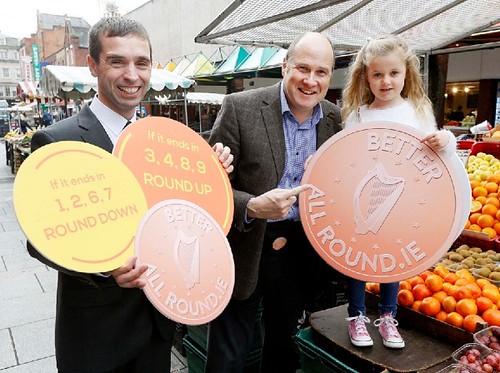
PREV ARTICLE
NEXT ARTICLE
FULL ISSUE
PREV FULL ISSUE
IRELAND RETIRES 1- AND 2-CENT COINS
A November 5, 2015 Coin Update article by Michael Alexander discusses Ireland's efforts to retire their smallest coin
denominations and encourage merchants and the public to embrace rounding for cash transactions. Alexander interviews Ronnie O’Toole of
the Central Bank -Editor

Ronnie O’Toole (left), Head of the Rounding Project, and former Member of Parliament for County Wexford, Ivan Yates (center), launch Ireland’s “Better All-Round” publicity campaign. On October 28 , Ireland joined the likes of Belgium, Finland, and the Netherlands when they effectively removed their two smallest coins from general circulation. The practice of “rounding” up or down to the nearest five cents has been considered by many in the euro-zone, though just four of the current nineteen member states have put this into practice. Finland was the first to do so after the adoption of the euro, as it was seen that these two coins were of little use in transactions within the Finnish economy. These coins are only being phased out of day-to-day transactions and remain legal tender that is exchangeable at banks and post offices for larger value coins. With any electronic purchase, the amount remains unaffected. The question of what to do with very small denominations comes up periodically in many countries, especially in the United States, where the lowly one-cent piece actually costs twice the amount of its represented value to produce. The argument that nothing can be bought with a one-cent coin on either side of the Atlantic is a strong one. This logic, combined with manufacturing costs, prompted Canadians to discontinue the production and circulation of their one-cent coin last year. Many in the U.S. have wondered how long it will take to see a similar decision from the Treasury and Federal Reserve. As we see a greater number of countries moving to lessen their coins in circulation, we’re also seeing an increase in developed economies moving toward cashless societies, in favor of technology-based and wireless payment methods. On October 28, Ireland launched “All Round” day, meaning that any purchase price could be “rounded” up or down to the nearest five cents. Michael Alexander of the London Banknote and Monetary Research Centre spoke to Ronnie O’Toole, the Central Bank’s Head of the Rounding Project, to learn why the Irish have joined a few other countries in the euro-zone in ditching their small cents. Michael Alexander (MA): I read about a trial project being launched last year in County Wexford to test the feasibility of eliminating these two coins from circulation. What were the conditions identified by the Bank that necessitated the idea? Ronnie O’Toole (RO): Inflation has caused the purchasing power of 1 and 2-cent coins to diminish by over 20 per cent since their introduction. These coins are of little value individually, with essentially no goods or services priced at this level. Their primary function in the payments system is to make change for larger transactions and facilitate the exact settlement of debts. The evidence suggests that 1- and 2-cent coins are not used actively by consumers and are expensive to mint. The large quantity of 1-cent coins issued annually, relative to existing stock, suggests that many of these coins are not actively circulated throughout the economy, but hoarded by consumers who do not like using them for transactional purposes, while others might simply be lost. Research conducted for the Central Bank in 2012 suggested a strong desire on the part of both consumers and businesses in Ireland to reduce or discontinue the use of 1- and 2-cent coins. Furthermore, the production costs of 1-cent coins exceed their face value (unit cost of 1.65c), with the production costs of 2-cent coins being only slightly lower than their face value (unit cost of 1.94c). MA: Was there any additional research the Central Bank carried out to arrive at this decision? Did they consider the example of Belgium, Finland, or the Netherlands, for instance, who also eliminated these two coins? RO: The primary research carried out was the trial in Wexford. The Wexford Rounding Trial was run from September 16 to November 17, 2013, with the aim of reducing the need for 1- and 2-cent coins, and showed strong support for rounding, both from consumers and retailers. During the trial, retailers rounded change for cash transactions to the nearest 5 cents at the cash register, removing the need for 1- and 2-cent coins in change. When “don’t knows” are excluded, 85% of consumers and 100% of retailers surveyed after the Trial believed rounding should be applied nationally. Following on the success of the Wexford Trial, in June of 2015 the government approved the national rollout of a voluntary rounding convention of amounts paid in cash nationally. To read the complete article, see:
THE BOOK BAZARREWayne Homren, Editor The Numismatic Bibliomania Society is a non-profit organization promoting numismatic literature. See our web site at coinbooks.org. To submit items for publication in The E-Sylum, write to the Editor at this address: whomren@gmail.com To subscribe go to: https://my.binhost.com/lists/listinfo/esylum All Rights Reserved. NBS Home Page Contact the NBS webmaster 
|